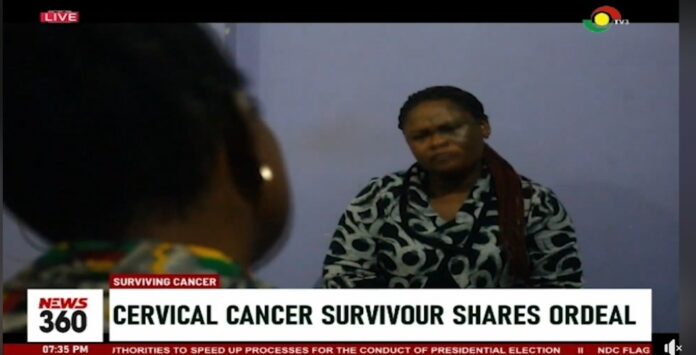Being diagnosed with cervical cancer could be one of the most difficult moments of a woman’s life. More troubling is losing your womb in the process.
That is the story of a 48-year-old cervical cancer survivor, and probably that of many women and those living with HIV, whose risk is about six to 10 times higher.
Meet Rita, not her real name, a 48-year-old cervical cancer survivor who radiates health and optimism despite the harrowing journey she has endured.
She received news of her diagnosis in 2019 after enduring six months of persistent bleeding, a sign of the silent battle raging within.
‘‘It wasn’t easy. You have no idea what I see when I enter the bath house. Huge clots of blood will just be falling off. After all tests I was informed I had cervical cancer but what helped me was that it was at stage one’’.

The cost of treatment was not just financial; it also cost her. Rita had to sacrifice her womb, adding another layer to the emotional toll she bore. She said ‘‘When I was given to the specialist, and he looked at my case, the first thing he asked was if I had children. And I answered yes. I have two children, then he said then I will remove your womb. I then told him, even if I don’t have a child and removing my womb will give me life, I will still do it. Since 2019 the money I remember spending just for the surgery was about GHC30,000. Chemotherapy is different’’.
https://fb.watch/qbn_Pmgxz3/
The widow, aside from grappling with cervical cancer, also has to deal with community stigma and it started from no other place than the church.
‘‘My own church members. Some of them they see me and look at me some way. So, it got to a time that I was not going to church. Sometimes they see you and talk to you and they want you to see that they are talking about you. The stigma was too much that I stopped going to the church’’.
The 2022 World Health Organisation (WHO) global cancer observatory report reveals cervical Uteri cancer as the most common cancer among women.

Cervical Uteri cancer ranks as the third leading cause of death, claiming nearly two thousand lives annually in Ghana.
For women living with HIV, the stakes are even higher, necessitating yearly screenings to enhance their chances of survival.
Madam Elsie Ayeh who is president for the persons living with HIV (NAP+GH) says there are gaps. ‘I can’t say that we have been doing it as routinely as it should be done so we need to get, more women to screen,’’ she said.
Despite the urgent need for effective strategies, Ghana is grappling with limited success, hampered by insufficient data and a lack of clear policy direction.
Dr. Ayisi Addo is the Programmes Manager for the National Aids Control Program.
‘‘We need to pay attention to the fact that despite treatment, people still come with advanced cases of HIV diseases and part of the conditions could be cervical cancer. And because we have not put in a system to track it, we are missing them. So, it’s a missed opportunity,’’ he emphasized.

Pap smear screening costs vary across facilities. The Pap smear is not covered by the National Health Insurance Scheme (NHIS). Currently, Ghana lacks a national programme for cervical cancer screening.
Deputy Director in charge of family planning at the Ghana Health Service, Dr. Chris Fofie says it’s time to have discussions for a national program.

‘‘The number of women who have been screened for cervical cancer is quite low and we think that it’s time we start a conversation to have a national program for prevention of cervical cancer management,” Dr Fofie said.
Meanwhile, the I-CERV-GH project, spearheaded by the Noguchi Memorial Institute and the government, is seeking to integrate cervical cancer screening into routine care for those living with HIV.
The principal investigator for the I -CERV-GH at NOGUCHI Professor George Boateng –Kyei wants policy makers to prioritize issues affecting women living with HIV.

‘In a lot of places women living with HIV are screened for every year or two for cervical cancer. But in Ghana at the moment, we don’t have a national program for screening for anybody. So even if we don’t have a program, we should at least have a program for screening for people living with HIV’’.
According to the WHO, nearly 500,000 new cervical cancer cases are recorded annually globally, with 80% of the cases occurring in developing countries.
The agony and struggles faced by women with cervical cancer are indescribable, especially for those who tragically lose their lives to it.
By Sarah Apenkroh, 3News.com







